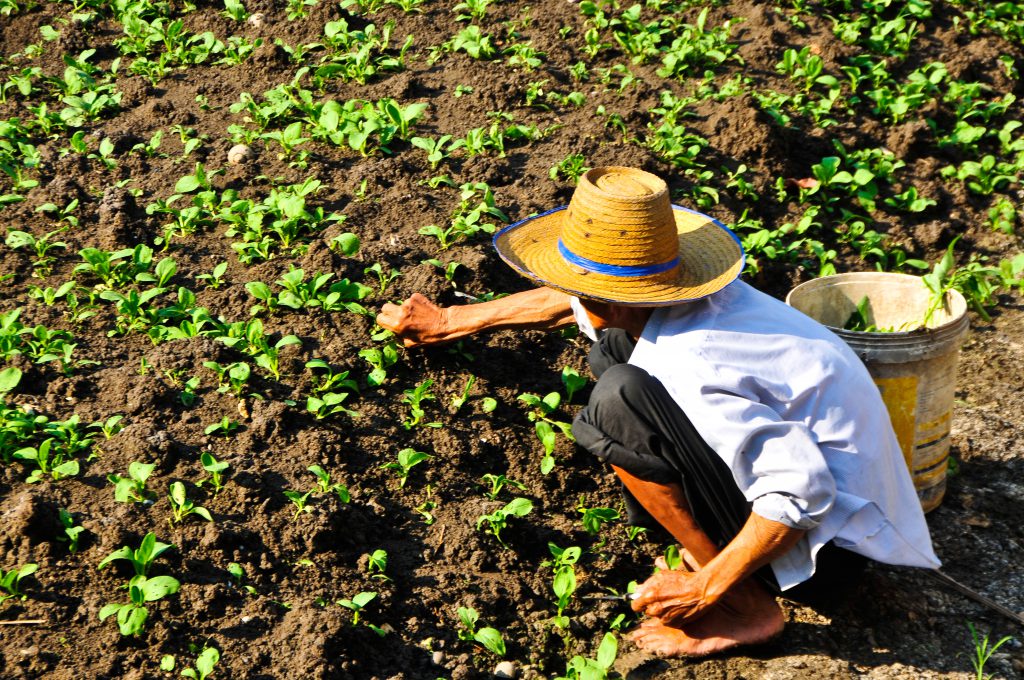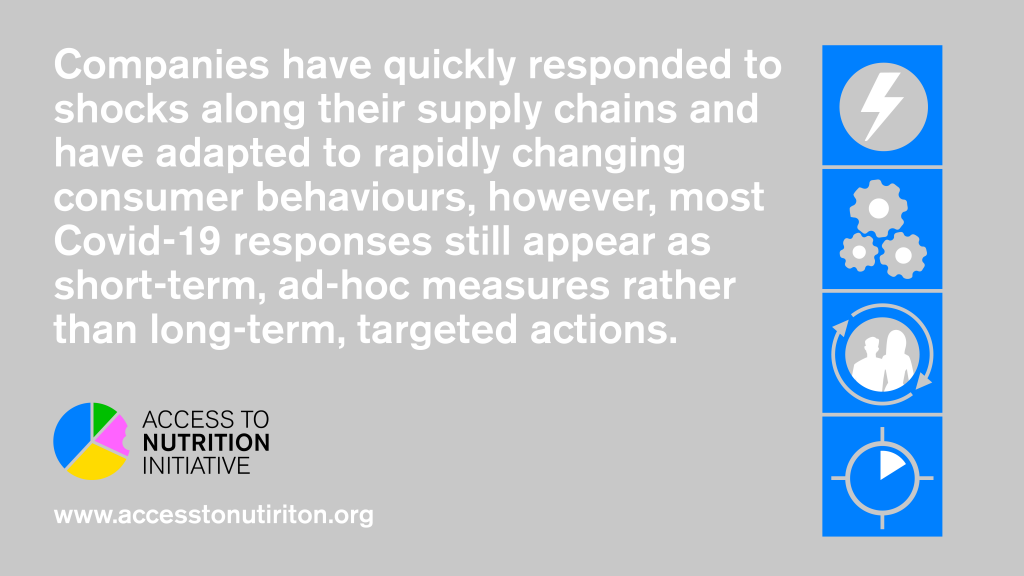
Covid-19 and The Food System: A Year On
17 December 2020By Martina Asquini
It’s hard to pinpoint the beginning of Covid-19. The novel coronavirus was named COVID-19 by the World Health Organization on February 11, 2020 and the state of a pandemic was officially declared. But the first cases of the virus were detected in Wuhan, China, long before that.
About a year since the beginning of the health crisis that has shaken the whole world and dramatically shifted the world’s priorities, ATNI reflects on emerging challenges and opportunities for the nutrition agenda and for global food and beverage manufacturers.

A 2019 study published on the Lancet posed that obesity, undernutrition and climate change constitute a global syndemic (i.e. a synergy of epidemics) which affects most people, in every country and region worldwide. The Covid-19 pandemic has exacerbated this syndemic and put the nutrition agenda at a crossroads.
As of December 7, 2020, the WHO reported 66,243,918 confirmed cases of Covid-19, including 1,528,984 deaths worldwide. The pandemic has reached every corner of the globe, establishing a ‘new normal’ made of social distancing, face masks, and working from home.
There is, however, another ‘new normal’, one consisting of income loss, rising food prices, and deteriorating diets. In April 2020, the World Food Programme (WFP), estimated that a further 130 million people would be pushed into acute hunger by the end of the year. A recent study by the Standing Together for Nutrition Consortium found that by 2022, Covid-19 could result in 168,000 additional child deaths.
As highlighted by Chief Economist of the Food and Agriculture Organization of the UN (FAO), Maximo Torero, the economic impact of Covid-19 is four times greater than that of the 2008 financial crisis – this is likely to result not only in decreasing dietary diversity and the worsening of nutrition indices, but also in exacerbated inequalities within global food systems.
As outlined in our first report, indeed, Covid-19, rather than acting as the ‘great equaliser’ that some initially thought it to be, is exposing systemic social injustice and inequity, epitomised by the global Black Lives Matter movement. It is essential that the impact of nutrition on populations vulnerable to Covid-19 (such as older people, those with underlying conditions and specific ethnic populations) is considered, and that the social determinants of health are considered in policies aimed at promoting health equity.
One of the main messages arising from the #ResettingFood webinar organised by the Barilla Centre for Food and Nutrition and FoodTank was that innovation in technologies, financial incentives and public policies must accelerate the transition of agri-food systems towards equity, resilience, healthiness and sustainability. This message resonates with ATNI’s mission of creating a world where no one goes to bed hungry and everyone has access to a healthy diet with all nutrients needed to grow and develop fully.
At a time when food production, distribution, and consumption have rapidly and radically changed, and, more importantly, when the relationship between nutrition on health has become more important than ever, private sector accountability is crucial. ATNI’s Covid-19 project, a four-item report series commissioned in March 2020 by the UK Foreign, Commonwealth and Development Office, aims at holding global food and beverage companies accountable for their pandemic responses.
If the nutrition agenda is at a crossroads, so are food and beverage manufacturers, for whom “the emergence form the pandemic will be less a moment of relief and more a point at which the focus returns fully to the existing and mounting environmental challenges and social issues around nutrition the food sector was already facing”, as highlighted in an editorial by JustFood. ATNI’s research shows that there is increased consumer engagement on the benefits of good nutrition for individual health – for example, the perceived impact of certain product types (such as the dairy sector in Asia) in relation to immunity and Covid-19 – this trend cannot be ignored.
The latest report in ATNI’s series, published in October 2020, adopted the research framework developed in July 2020 to assess nutrition sensitive responses to the pandemic by the 39 largest food manufacturers globally. Findings from the report indicate that although manufacturers have successfully managed to quicky adapt to the operational challenges posed by the pandemic, only a few have taken this opportunity to embed nutrition and resilience in their long-term planning.
In November 2020, ATNI organised a multistakeholder webinar to present report findings. Here are some of the key points made
- There is a need for greater transparency, for instance with regards to lobbying on public health policies;
- Better data as well as SMART commitments and reporting, the kind investors can use to drive ESG decisions on nutrition, are needed;
- Supply chain resilience, and especially support for supply chain partners that are SMEs, must become a priority.
As highlighted by ATNI’s Director, Inge Kauer, at the event, “companies should focus on the longer-term strategy. ATNI’s work demonstrated that better progress is made once companies develop a strategy and a management system to monitor and disclose their progress.” As 2020 comes to an end, ATNI hopes to see companies pivot their upcoming annual reviews on emerging priorities such as greater consumer engagement on healthy nutrition, greater need for resilient supply chains, and rising concerns about employee health and responsible marketing.
ATNI will continue to monitor company responses to the pandemic and publish its findings in the second and third report of the Covid-19 project. The third report, due in Q1 of 2021, will look at the impact of the pandemic on food systems and nutrition in three lower/ middle-income countries: India, Mexico, and Nigeria. An analysis of corporate responses by the largest food and beverage manufacturers operating in these three markets will be included.
Innumerable calls to action have been made by nutrition stakeholders all over the globe, asking for policymakers, the food industry, investors, NGOs, chefs, farmers, and consumers to promote food systems transformation.
Speaking at the Nutrition for Growth #NutritionYearOfAction launch event co-hosted by the Governments of Canada and Bangladesh, in partnership with the Government of Japan, GAIN Director Lawrence Haddad said: “while summits can be postponed, nutrition targets cannot. We cannot simply reschedule them, just as we cannot simply reschedule malnutrition.”
Covid-19 has put the nutrition agenda at the crossroads of action or inaction – in the Nutrition Year of Action, ATNI will continue its work to ensure that food and beverage manufacturers do act on nutrition.
Visit the Covid-19 project page for more information and please do not hesitate to get in touch if you have questions or feedback on the project so far. Email fiona.kirk@accesstonutrition.org.

